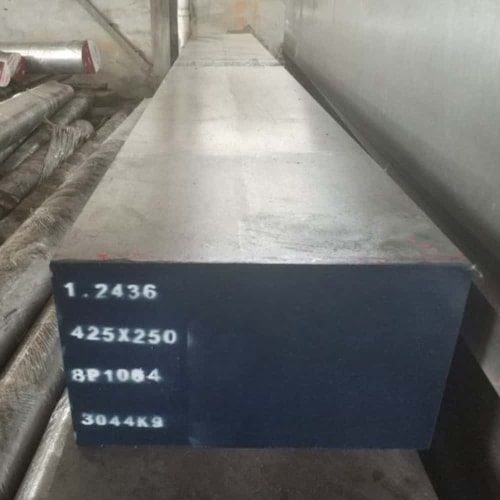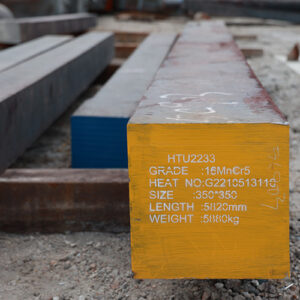Introduction

Alloy steel flat bars are indispensable in modern industries due to their exceptional mechanical properties and versatility. Composed primarily of iron with varying amounts of alloying elements such as chromium, nickel, and molybdenum, these flat bars exhibit high strength, excellent toughness, and resistance to wear and corrosion. This blog explores in-depth the diverse applications and advantages of alloy steel flat bars across different sectors.
Properties of Alloy Steel Flat Bars
Alloy steel flat bars are renowned for their robust properties, making them ideal for demanding applications:
- High Strength: Alloying elements enhance the strength and hardness of the steel, crucial for structural components and load-bearing applications.
- Toughness: They withstand impact and stress, making them suitable for machinery parts and tooling.
- Corrosion Resistance: Chromium and nickel additions provide resistance to corrosion, crucial for outdoor and marine applications.
- Wear Resistance: Molybdenum additions improve wear resistance, essential for tools and wear parts.
These properties ensure reliability and performance under extreme conditions, distinguishing alloy steel flat bars from conventional materials.
Industrial Applications
Alloy steels find extensive use across diverse industries:
Manufacturing
In manufacturing, alloy steels are integral to producing machinery parts, tooling, and equipment frames. Their high strength and machinability facilitate precise manufacturing processes, enhancing productivity and product quality.
Construction
In construction, alloy steels are employed in structural components, supports, and frameworks. Their ability to withstand heavy loads and harsh environmental conditions ensures the durability and longevity of construction projects.
Automotive
The automotive industry utilizes alloy steels in chassis components, axles, and suspension systems. These components require high strength, impact resistance, and fatigue endurance, characteristics that alloy steel flat bars readily provide.
Oil and Gas
Alloy steel flat bars are critical in the oil and gas sector for applications such as drill collars, pipelines, and offshore platforms. Their corrosion resistance and strength make them suitable for harsh and corrosive environments, ensuring reliability in exploration and production operations.
Aerospace
Aerospace applications demand materials with high strength-to-weight ratios and resistance to fatigue and impact. Alloy steels are used in aircraft landing gear, structural panels, and engine components, where their properties contribute to the safety and efficiency of aerospace operations.
Advantages of Alloy Steel Flat Bars
The advantages of alloy steels extend beyond their mechanical properties:
- Machinability and Weldability: They are easily machined and welded, allowing for complex shapes and assemblies.
- Cost-Effectiveness: Their durability and low maintenance requirements result in long-term cost savings.
- Versatility: Available in various grades and sizes, alloy steels can be tailored to specific application requirements, enhancing versatility and usability in diverse industrial sectors.
Case Studies and Examples
Table: Applications of Alloy Steel Flat Bars
| Industry | Application |
|---|---|
| Manufacturing | Machinery parts, tooling |
| Construction | Structural components, supports |
| Automotive | Chassis components, axles |
| Oil and Gas | Drill collars, pipelines |
| Aerospace | Landing gear, structural panels |
This table illustrates the widespread use of alloy steels across key industries, highlighting their critical role in modern industrial applications.
Environmental Considerations

Alloy steels contribute to sustainable manufacturing practices due to their recyclability and long service life. By reducing the need for frequent replacements and repairs, they minimize environmental impact while supporting efficient resource utilization.
Conclusion
Alloy steel flat bars are integral to modern industrial applications, offering unparalleled strength, durability, and versatility across manufacturing, construction, automotive, oil and gas, and aerospace sectors. Their unique properties make them indispensable for critical components where reliability and performance are paramount. Understanding the applications and advantages of alloy steels enables industries to optimize their operations and achieve enhanced efficiency and durability in their projects.
FAQ
Q: What are alloy steel flat bars made of?
A: Alloy steel flat bars are primarily composed of iron with alloying elements such as chromium, nickel, and molybdenum to enhance their properties.
Q: How are alloy steel flat bars manufactured?
A: They undergo processes like hot rolling and cold finishing to achieve the desired dimensions and mechanical properties.
Q: What are the main benefits of using alloy steel flat bars?
A: Alloy steel flat bars offer high strength, toughness, corrosion resistance, and machinability, making them suitable for a wide range of industrial applications.
